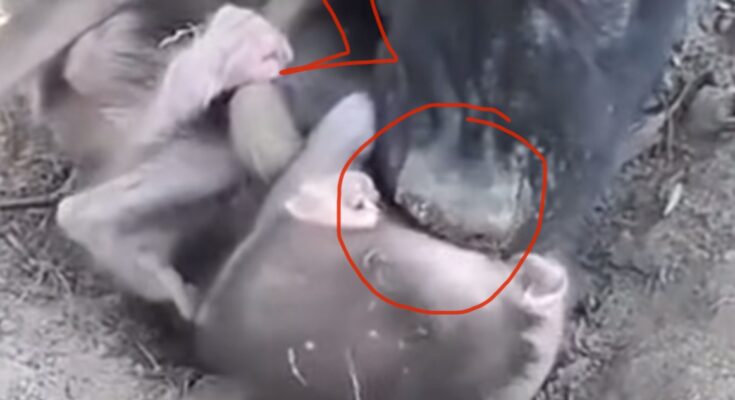In a heartbreaking incident that has captured the attention of animal lovers and conservationists alike, a baby monkey was left permanently blinded after being bitten by a stray dog in a remote village in South Asia. The young primate, barely a few months old, was found crying and disoriented by local villagers after the attack, which occurred near the forest edge where both domestic animals and wildlife often interact.
According to eyewitnesses, the monkey had wandered too close to a settlement, likely in search of food, when it was attacked by a pack of stray dogs. While adult monkeys in the troop managed to escape, the infant was not so lucky. A single bite near the face led to severe damage to the monkey’s eyes, causing irreversible blindness.
Local animal rescue volunteers arrived on the scene and transported the injured monkey to a nearby wildlife rehabilitation center. Despite receiving immediate veterinary attention, doctors confirmed that the damage to the optic nerves could not be repaired. The baby monkey is now recovering, though it will never regain its sight.
This incident highlights a growing issue at the intersection of urban expansion, habitat loss, and rising stray animal populations. As forests shrink and human settlements grow, animals are increasingly forced to live in closer proximity to domestic species, which can result in dangerous and sometimes deadly encounters.
Wildlife experts note that such interactions are becoming alarmingly common in areas where forest corridors are fragmented by roads, farms, and urban development. “When wild animals come into contact with stray dogs, the consequences can be devastating, especially for young or injured animals,” said Dr. Meera Kaul, a veterinarian working with the wildlife rescue center.
The case also sheds light on the pressing need for humane management of stray dog populations. In many regions, stray dogs are left to fend for themselves without access to food or healthcare. This leads to increased aggression, especially in areas where competition for food is high.
Animal welfare organizations are calling for a dual approach to tackle the issue — conservation efforts to preserve natural habitats for wildlife, and community-based sterilization and vaccination programs for stray dogs. Education campaigns are also vital to inform local communities about the importance of coexisting with wildlife without endangering them.
Meanwhile, the baby monkey — now named “Asha” (meaning hope) by her caregivers — is slowly adapting to her new life at the center. She is being taught to rely on her other senses to navigate her environment and is receiving round-the-clock care from volunteers. Though she may never return to the wild, her story is already inspiring calls for action across social media platforms.
As human-wildlife conflict becomes more frequent, the tragedy of Asha is a stark reminder of the price animals pay in a world increasingly shaped by human activity. It’s a call to rethink how we share our spaces — before more innocent lives are lost.



